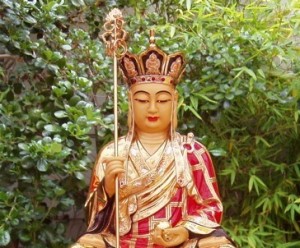Discourse given by Venerable Dharma Teacher Long Hui:
Statue of Kshitagarbha Bodhisattva at Hua zang Si
Upon the thought of the seventh month of the Chinese lunar calendar, a lot of Chinese people will have a misconception that this is not a good month for all events. For example, it is not good to get married or move. It is even worse that on the fifteenth day of the seventh lunar month so called “Universal Salvation,” many households kill livestock as offerings to the beings in the Ghost realm. This is a very wrong practice because the seventh lunar month is in fact “The Buddha Happy Month.” There are two joyful days in this month.
The first joyful day is “Buddha Happy Day,” which is on the fifteen day of the seventh lunar month and was originated from the time of Shakyamuni Buddha. Among the Buddha’s disciples there was abhikshu by the name of Maudgalyayana. At that time, he had attained greatsupernatural powers including the six great supernatural powers. One day, with his supernatural power of divine eyes, he saw that his birth mother of that lifetime had been reborn in the Hungry Ghost realm. Her belly was as big as a pot and her throat was as narrow as a needle. Based on her condition, she was not able to take in any food or even drops of water.
Venerable Maudgalyayana could not bear to see his mother suffer. He then decided to use his supernatural power to help her. Unfortunately, any food she took in would immediately turn into burning charcoals.Venerable Maudgalyayana was devastated and in tears. He told the Buddha about this incident. The Buddha told him with compassion the reason why his mother received such karmic retribution. It was because she did not believe in the law of cause and effect and she insulted the Buddha and slandered the Sangha. This was karmic retribution for slandering theThree Jewels (The Buddha, the Dharma, and the Sangha). Maudgalyayana‘s power alone could not help with the situation. He had to rely upon the unified powers and merits of the Sangha to save his mother.
Every year, on the fifteenth day of the fourth month, monastics from ten directions started a series of intensive studies until the fifteenth day of the seventh lunar month. During the three months, the monastics would be in retreat and concentrate on exerting their efforts on self-cultivation. The fifteenth day of the seventh lunar month was the end of the precepts. That is why it is called the “Buddha Happy Month.” The Buddha as well as all other Buddhas, is pleased on this particular day.
People who make offerings to these monastics on this day will receive great benefits. All of their deceased parents and relatives will be free from the sufferings of the three lower realms. If their parents are alive, they will have prosperity in terms of daily supplies, longevity, health, peace, and auspiciousness. This practice is the true and orthodox way of eliminating sufferings and raising consciousness to a higher realm for the deceased.
This form of making offerings to the Sangha is called Ullambana (Yu Lan Pen). It is considered a day to repay the kindness to parents who we are indebted to. Unfortunately, such an auspicious day has turned into a demonic day since over time people have misinterpreted the meaning of making offerings and developed a custom of killing livestock as sacrifice. The pure practice of making offerings to the Sangha has turned into a custom of offering sacrifice to ghosts andspirits. It does not only deviate from the Buddha’s teachings on loving kindness and compassion and the correct way of accumulating good fortune and wisdom but also spoils the original good intention of Venerable Maudgalyayana in urging people to practice the virtue of filial piety and pay respect to parents. We should carefully follow the teachings and stop the erroneous practice.
The second joyful day falls on the thirtieth day of the seventh lunar month. It is the holy birthday of Ksitigarbha Bodhisattva. Ksitigarbha Bodhisattva of Great Resolution is well known for saving living beings in the hell realm and his vow of “not to reach Buddhahood until all thehells are empty.” Ksitigarbha Bodhisattvahas the great endurance and deeds that others do not have. His mind is as vast as the sky and he has perfected the practice of the six paramitas. He has attained the virtuous marks of a Tathagata. He has a unique affinity with living beings who suffer in samsara, which is the world that we live in. If people can recite regularly “The Sutra of the Past Vows of Ksitigarbha Bodhisattva,” they will understand the suffering in the hell realmand then stay away from greed, anger, and ignorance. They will believe in the law of cause and effect and learn Ksitigarbha Bodhisattvas‘ great vow of compassion. Ultimately, they will achieve Ksitigarbha Bodhisattva’s level of wisdom and wonder deeds and become a Bodhisattva.

